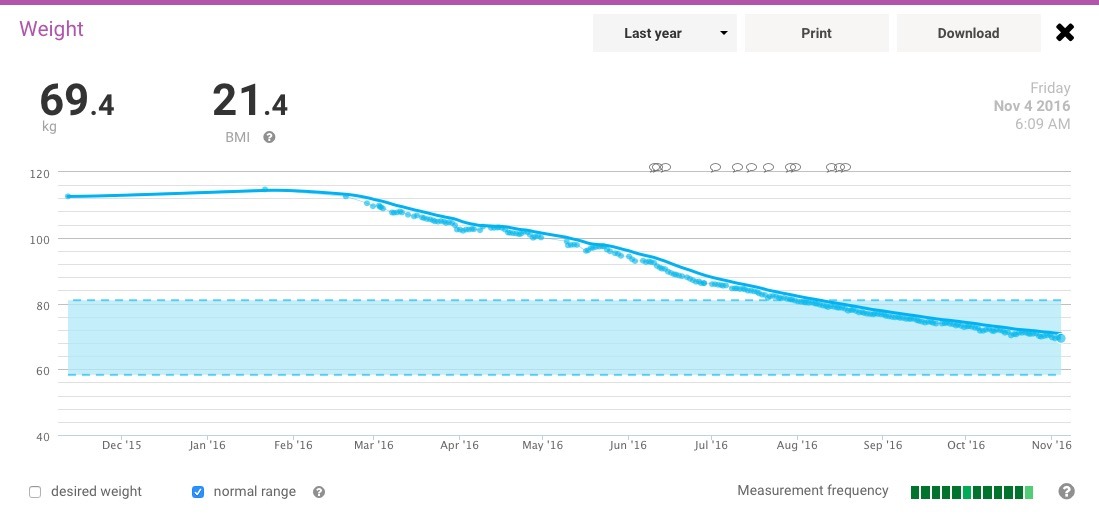Now that I’ve lost over 45kg from my starting weight of 114.7kg, yes that’s under 70kg, I should write down some key points that helped me lose weight. I’m not a medical doctor of any sort. This has been based on my personal experience – yours will vary.
10% energy is used by digestion processes.
20% energy is used by exercise.
70% energy is used by the body maintaining itself.
What did I do? I typically over the course of the past 10 months stuck to anywhere between 50% (earlier on) to 70% (more recent) of my RDI for energy intake which varies greatly based on weight/height. As I lost weight my energy plummeted from over 10,000kJ to around 7,700kJ. That’s almost a 50% drop, but I have lost almost 50% of my initial weight so the math seems pretty sound. If I could do it all again, I’d have stuck to 60-70% as the energy deficit.
Carbs, protein, and fats all need to be consumed in a good ratio. For the most part, I have been using 40-50% energy from fat, 20% from carbs, 30% from protein. Note this is energy from each group, not weight. Fat has almost twice the energy of carbs and protein per gram. Carbs and protein are virtually the same, how cool is that? Also, avoid alcohol, it’s got more energy in it than life itself.
Protein is a tricky one as having too much of it can cause damage to the kidneys. Too little results in insufficient repair/maintenance parts for your body. I’ve been sticking to somewhere between the RDI and double the RDI (64-120g) per day split over three meals – at least 20g per meal.
Fats are important and are great at satisfying hunger. Avoid trans and saturated fats. Some saturated fats are good though, no need to eliminate them completely. The body can always make saturated fats if it needs them. Trans fats, on the other hand, are useless. Polyunsaturated fats are the best (salmon), monounsaturated come in at second place and are fine to eat lots of. Get those polyunsaturated fats though, they are the best of the bunch.
Carbohydrates are best had when they have a low GI – i.e. non-sugar carbs. They are used as preferred fuel for the body. Fats come in next then protein. You don’t want the body using protein for energy though, it will waste away at your muscles if your energy intake is too low – very bad!
Sugar carbs are bad, non-sugar carbs are good. The lower the glycemic index (GI) the better. Low GI foods release glucose more slowly and steadily. From what I’ve read this is good for a couple of reasons including a reduction in the amount of insulin floating around in your veins. If that happens too much you are on the way to obesity (as the insulin helps store the excess sugar as fat), insulin resistance (prediabetes) and then full-blown diabetes (when insulin is no longer effective at mopping up the sugar).
Vitamins and minerals are very important if you are going to try a running at a calorie deficit. Chances are you’ll miss out on a few food groups. I sacrificed vegetables and fruit almost completely. They are too much hassle for me to prepare and don’t appeal to me much at all. I’ve always been a bit like that though. So make sure you are hitting your RDI / AI on your vitamins and minerals.
My diet might be boring, (chicken, salmon, toast, milk) but it’s worked wonders for losing weight loss. I hope this post helps guide someone in the right direction! 🙂
